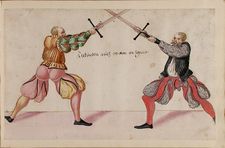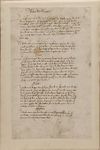| Codex Amberger |
|---|
Amberger Collection
Towson, Maryland |

Anbinden auch ettwan der schnitt (folio 14r) |
|
|
| Type |
|
|---|
| Date |
ca. 1550s |
|---|
| Language(s) |
Early New High German |
|---|
| Author(s) |
Unknown |
|---|
| Illustrator(s) |
Unknown |
|---|
| Material |
Paper, bound in 1840 |
|---|
| Size |
16 folia |
|---|
| Format |
Single-sided; one illustration per page,
with scattered text |
|---|
| Script |
Bastarda |
|---|
| Treatise scans |
Digital scans (varies) |
|---|
Codex Amberger is a German fencing manual probably created in the mid 1500s.[1]. The original currently rests in the private collection of the J. Christoph Amberger in Towson, MD (USA). The manuscript is a fragment, containing only nine plays of wrestling, three of messer, and one each of dagger, longsword, and staff. It has no consistent foliation, and was probably originally part a larger work.[2] Based on the images released thus far, the manuscript seems to be largely a copy of Christian Egenolff's 1530s fencing anthology Der Altenn Fechter anfengliche kunst. A few of the images may instead be related to the manuscripts of Paulus Hector Mair.
Provenance
Contents
| Folio
|
Section
|
| 1r - 8r
|
Illustrations of grappling devices
|
| 9r - 10r
|
Illustrations of dagger devices
|
| 11r - 13r
|
Illustrations of messer based on Johannes Lecküchner
|
| 14r
|
Illustration of longsword devices (captioned "Anbinden auch ettwan der schnitt")
|
| 15r
|
Illustration of staff devices
|
| 15v
|
Anonymous grappling devices
Draft Translation 
by Chris Treichel
|
Transcription
by Dierk Hagedorn
|
| The Wrestling follows
If someone runs at you and grabs both of your arms and you to his (arms?) so let him push you and not to much against you. Notice when he wants to try to throw you or tilt, so kick with the right foot to him and hit him with the foot on the thigh. So kick with the right foot to him and hit him with the foot on the thigh on the other side. Help him with the arm and push him over himself, thus he falls.
|
Volget das Ringen
Lauft einer Zuo dir vnd begreift dir beÿde arm / Vnd du Ime die seinen / so las dich dringen / vnnd sich das du nicht zu sehr an dich zwingst oder druckest / Merck wen ehr dich will werffen oder schrencken / so trit mit dem rechten Fus Zuo Im Vnnd schlage In mitt dem Fus an schenckel / auf der andern seÿten hilf Im mitt dein arm / Vnnd stos In vber sich / so felt ehr.
|
| If someone wants to do this to you, so notice when he wants to place his foot, so move your foot and place it behind his, off-balance him on the other side by his arm [push] over himself so he goes down.
|
Will es dir einer thun / so merck wen ehr dir den fus will versetzen / so Zeuch dein Fus vnnd setz In hinder den seinen / nim die wag vf der andern seytten / bey seinem Arm / stos [?] vber sich / so geth ehr dahin.
|
Runs someone to you with a spear, and means to stab you, and you have no other weapons, as a dagger so have no fear, grab your dagger to the cut from above/uppercut and put the left leg forward as he runs to you or stabs, so fall with your dagger against his spear from below push it above the head to the right side and with the left hand grab him his Gokker (could mean something like Gucker/looker, maybe his eye? Or Gurgel/his throat). Stab him where you will.
|
/Aliut./
Lauft einer Zu dir mitt eim spies / vnd meinet dich zu stechen / Vnnd du kein ander wehr hast / als ein degen / so forcht dich nicht / Fast deinen degen Zum Oberstich in der schneiden / Vnnd setze das lincke bein vor / In dem als ehr Zu dir lauft oder sticht / so fall im mit dem degen an sein spies / vonn vnden auff / vber dem haubt Zu der rechten seÿtten mitt der lincken hand / greyf Im In sein Goller / stich in wo du hin wilt.
|
If you have a rapier, your enemy a sword and he means to do so. Push quickly to him and wait until he tries to hit you in the head, so grab your rapier to the lower level. Move your left hand drive to the point of his rapier and come from below onto his sword, grab his clothes with the left hand or over both of his arms and work with the rapier.
|
Aliut.
Hastu ein degen / Vnnd dein Feind ein schwerd / Vnnd ehr dich meint / so triet fest zuo Im / Vnnd warte wan ehr dich Zum kopf schlecht / so fas dein degen Zum Vnderstich / Zuck bald hin mitt der lincken hand / Far Im an die spitz deins degens / Vnnd kum von vnden auff an sein schwerd / Zu hand greuf mitt der Linck~ hand an sein gebunde / oder Vber seine beÿde arm / Vnnd arbeÿt mit dem degenn.
|
Notice when he wants to grab your arm. Grab him to you with a kick away and push him with the left hand away from you.
|
Oppositum
Wart wen ehr dir dein Arm will greÿffen / Zuck an dich mit einem Abtrit / vnnd stos In mitt deiner linck~ hand von dir.
|
|
Gallery
Additional Resources
References
- ↑ According to its 1840 binding it dates to 1512, but this doesn't fit with the timeline suggested by the content of the manuscript.
- ↑ J. Christoph Amberger. "Two-handed Sword; Germany, c. 1550". Fencing Classics. 30 January 2009. Retrieved 24 November 2010.










